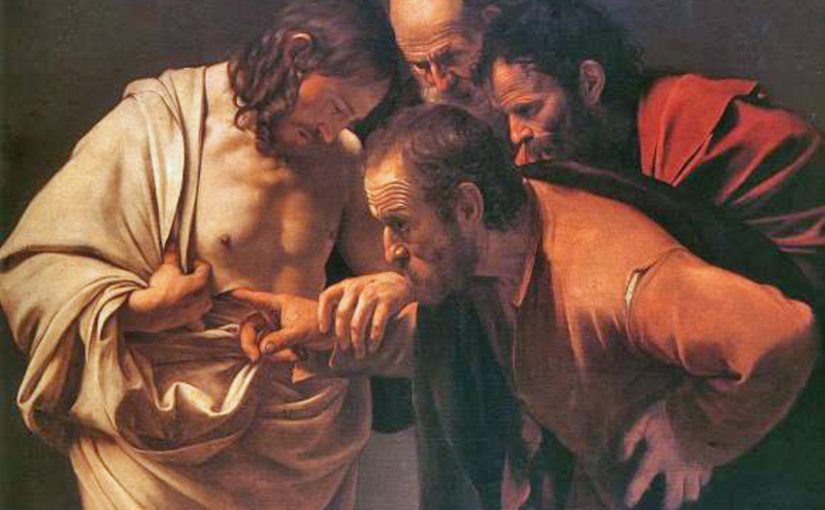A homily for the Second Sunday of Easter, April 19, 2020
Acts 2:42-47, 1 Pt 1:3-9, Jn 20:19-31
The Nicene Creed and the Apostles’ Creed — their names derive from the Latin “credo,” “I believe.” Even the most recent (and much-maligned) translation of the Roman Missal swapped in “I believe …” for the former “We believe …”, to assert that each of us individually embraces the truths contained in these statements of faith.
God the Father, the Creator.
Jesus Christ, God’s only begotten son, the Messiah who saved all of humanity from sin and death.
The Holy Spirit, who sustains humanity on our path home to God’s kingdom with abundant grace for all who ask for it.
These truths also form the core of the baptismal liturgy, spoken as the encapsulated promises that parents make on behalf of their children during this Sacrament of Initiation — promises that all the faithful renew during the Easter Vigil. The conclusion to this litany wraps it all up neatly and reverently: “This is our faith. This is the faith of the Church, and we are proud to profess it, through Christ Our Lord. Amen.”
(Quick aside: As a youngster I thought the Nicene Creed was the “nicer creed” because it didn’t say “hell” while the Apostles’ Creed did.)
So our creed, in whichever form we choose to proclaim, is a complete summary of who we are as Catholic Christians, a fits-in-your-pocket list of things we believe. Much like the oft-quoted/paraphrased “If you pray nothing else but ‘thank you,’ that’s enough,” from Meister Eckhart, our creed keeps beliefs simple, compact. Easy to break open.
And that’s a wonderful thing.
In today’s Gospel from the evangelist John, Jesus tells Didymus, “Blessed are those who have not seen and have believed.” Those include us, of course; we have not seen Jesus in the flesh.
And yet … we have, if we are in sync with the 25th chapter of Matthew’s Gospel (Mt 25:33-40), seeing Christ in all humanity, especially the least of us.
Because true faith requires action, which will return — must return — when the coronavirus crisis ends. The second Letter of St. James (Jm 2:14-26) declares faith without works to be dead. Harsh, but true.
So let’s be un-harsh.
Faith with works is alive, very much so.
Now, what do we know about living things?
First, they must be fed. To feed faith, we have the Eucharist, the Word, the reflections and ponderings and insights of Church — us, all of us — guided by the Spirit. Check.
They need shelter. Our souls and our hearts are perfect places for faith to reside. Check.
Living things should be exercised regularly. That’s where doing good works comes in. We need only eyes to see and ears to hear to know what needs to be done. Even now, physically distancing from each other, we can use any number of technologies to be social, to support each other. To do little tasks for one another, six feet apart and heavily sanitized, that recognize Christ in all of us. Check.
They should be loved and embraced. Hmmm.
“Credo” is an action verb. When we were baptized, when we repented and reconciled for the first time, when we received First Holy Communion, even when we were confirmed, we were not supposed to put faith on auto-pilot. We weren’t supposed to say “Sounds good to me; I’ll buy in,” and aim ourselves in a straight line at a constant speed on a smooth path to Heaven. No adjustments ever needed.
No, we were not supposed to.
“Credo” is an action verb that guides our lives full of twists and turns. Lives with a whole lot of activity.
Activity requires choices, which is why we must choose to love and embrace our faith. To think about, to deeply ponder what we believe, and then wrap our arms around it.
Daily.
Hourly.
Maturely.
 Children believe in Santa and the Easter Bunny out of simple faith. They believe in something that brings them joy, and when they learn the truth, depending on how old and how mature they are, either they move on and they’re fine, or they have to have their naive belief pried from them, and they’re heartbroken.
Children believe in Santa and the Easter Bunny out of simple faith. They believe in something that brings them joy, and when they learn the truth, depending on how old and how mature they are, either they move on and they’re fine, or they have to have their naive belief pried from them, and they’re heartbroken.
As adults, we’re blessed with greater wisdom, greater experience, and far more options. We’re blessed with a grown-up, two-way relationship with God.
We’re blessed with the joy of Easter truth — that Jesus died for us, for all of humanity, to fulfill God’s promise of salvation. That Jesus rose from the dead of his own accord, to destroy death and show the way to the rooms he is preparing for us in his Father’s house. That Jesus is with us always, and that his Spirit is with us anytime we call.
There are many ways we as Christians can be the sheep of Jesus on judgment day, can be the ones who fed and clothed and visited him, even without immediately recognizing him. That’s faith with works, faith in action.
But consider this: The first thing we can do to put faith into action is to believe. To choose to believe. To choose to grab hold of the faith the way a parent holds a child’s hand in a crosswalk, the way a lifeguard clings to a drowning person and swims to shore, the way a person in peril finds that last ounce of strength when they’re dangling off the edge of a cliff.
To choose to weave Truth, God’s Truth, all of it, into the very fabric of who we are.
No, we haven’t seen the 33-year-old Nazarene carpenter and touched his wounds, as Thomas was finally able to, but we do see wounded 3-year-olds and 63-year-olds and 93-year-olds, and our active, energized faith is our blessing to them.
And to us.
